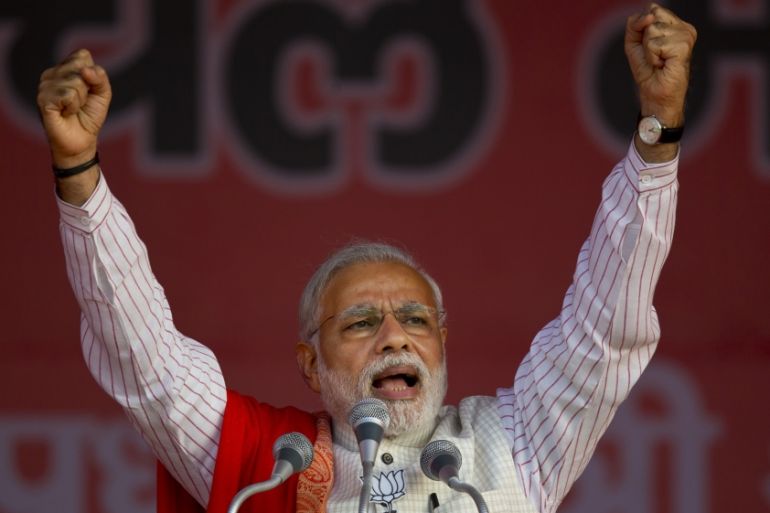High expectations for India’s much anticipated budget
It remains to be seen if the government’s economic programme will reflect a good economic vision or a bad political one.

India’s budget for more than a billion people is a mammoth task, laced as it is with massive expectations.
The 2014 budget is touted as one of the most awaited since 1991, which Dr Manmohan Singh presented as the-then finance minister.
Keep reading
list of 4 itemsChina’s economy beats expectations, growing 5.3 percent in first quarter
Inside the pressures facing Quebec’s billion-dollar maple syrup industry
Manipur’s BJP CM inflamed conflict: Assam Rifles report on India violence
That one turned India into a liberal economic regime and transformed the fiscal destiny of the country.
This one is expected to build on that foundation and bring in what is now regularly described as “Big Bang reforms”.
The country and the world is expecting Prime Minister Narendra Modi to deliver as promised to the globalised economic world.
The Economic Survey, tabled in the Indian parliament on Friday, received a cautious optimistic response.
Over eight percent growth, and the hope of getting into double digit growth, was attributed more to statistical wonder than to performance indicators.
Sitaram Yechury of the Indian Communist Party dismissed it as “lies, damned lies and statistics. The economic survey is a statistical gimmick”.
He claimed that contrary to claims in the report, there has been a decrease in export and agricultural growth.
Some are not as dismissive. Industry body FICCI President Jyotsna Suri said: “The Economic Survey has highlighted that India is at the cusp of higher growth trajectory.
“While the process of recovery has started, we need to continue with reforms process to ensure that we are firmly rooted on a sustainable growth path.”
Constituencies
On Saturday, when Finance Minister Arun Jaitley will stand to present the second budget of this government, he will have the mammoth task of satisfying three constituencies.
1) The Engine: The corporate world, which has backed the Modi government and before that the right-wing Bharatiya Janata Party (BJP), is hoping that the new government will lose no further time to bring in much expected reforms of economic processes, like labour law reforms, to facilitate the ease of setting up, operationalising and doing business in India, clarity on tax regimes, and a boost for SMEs.
Recently, Indian industry gave the first sign of losing patience with the current government when Deepak Pareikh, Chairman of Housing Development Finance Corporation (HDFC) said: “After nine months, there is a little bit of impatience creeping in as to why no changes are happening and why this is taking so long having effect on the ground.
“The thing is that our prime minister had a lucky period in these nine months. The world commodity prices are at an all-time low, which help India the most,” Parekh said.
If this budget fails to live up to their expectation, chances are that it will signal the end of the “honeymoon period”.
2) The Opinion Maker: The strong middle class, which is the opinion maker for any political process, is expecting this budget to address issues like tax reform and help industry create more jobs. This class has been a strong support base of the rBJP in the 2014 elections which gave them a clear mandate, the first in the last 30 years.
3) The Barometer: India’s poor, over 70 percent of the population, constitute the group which finally decides the future of the government. This section would expect the new government to continue the pro-poor policies started by the previous government, but at the same time develop the infrastructure for growth. This class is the barometer of success or failure of the policies and programmes. They have been showing their anxiety with the way the new government has conducted itself. The local assembly elections in Delhi, which gave Modi’s BJP a thumbs down, was a clear signal of growing disenchantment. They prefer the pro-poor Common Man Party (AAP) to the business-friendly BJP.
While the engine continuing to fire is a must, the opinion makers must also be happy by the way the plan is presented before the barometer decides the outcome. This makes the task in Jaitley’s hands pretty daunting.
Expectations
The Economic Survey has laid down the course of expectation and some believe that it has failed to reassure the advent of “Big Bang reforms”.
There are political reasons for it too. The government has a full majority in the lower house of the parliament but it lacks the numbers to push the bills in the upper house.
The amendments it seeks to introduce to the 2013 Land Acquisition Bill will fall prey to that, unless the Modi government shows the resolve to press for a joint session clearance. Clean India and Skilled India are going to see the push they need. But the budget overall is a huge balancing act.
Modi gave a clear indication while delivering his vote of thanks during the presidential address on Friday in parliament, that his government will not abandon welfare schemes like MNREGA (rural employment guarantee scheme), and a food subsidy programme brought in by the previous Congress government.
If subsidies like these continue, the funding of expenditure heads will be difficult.
The government needs to regain its position of premier investor if it wants to kick start the utilisation of the demographic advantage so often referred to as India’s ‘big plus’.
Arun Jaitley and team Arvind Subramaniam, the chief economic adviser, are expected to deliver a please-all budget.
But good economics at times looks like bad politics – which route the new government will prefer remains to be seen.